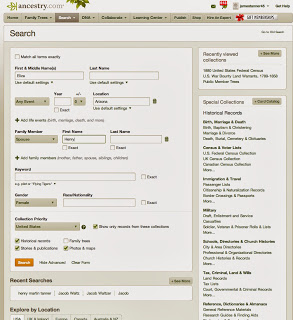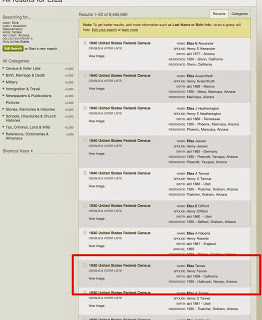Using Online Databases: from General to Specific Searches
How to search from general to specific to get better search results in genealogy research
The normal reaction of a genealogist confronted with an advanced search form on an online site is to start filling in all of the blanks with information about the ancestor. Contrary to the average impulse, the best search strategy is to put in as little information as is necessary to find the ancestor. I usually start with name, residence and gender. Then if that doesn't work, I begin adding one piece of information at a time, such as the spouse's first name and maybe a date. Each time you add one piece of information, you do the search over and see the results before editing the search parameters again by adding one more piece of information.
Why is this better than putting in all the information you know? Usually, the search engine (i.e. Ancestry.com's search or FamilySearch.org or whatever) will try to match as many fields as possible with records in the database. That will usually result in either false positives (responses that look similar to the one you are searching for but are not the right person) or no responses at all. Let me illustrate this with a couple of searches on Ancestry.
The first search will be for my great-grandmother, Eliza Ellen Parkinson Tanner. In the first pass, I will put in only her first name, no surname, the location as Arizona, her gender, and her spouse's first name Henry.
That's it. That's all I put into search on Ancestry.com. Here is a screenshot of the search fields filled in with this information:

Now here are the results of the search:

You can see that my great-grandmother and her family came up on the first page of results in the 1930 U.S. census. Could I force the entries to the top? Yes, probably by adding the surname. But why do that when you have found the family?
Learning to search the Web is a skill, just like any other learned skill, such as playing piano or swimming or riding a bicycle. There are some genealogists who have a talent for searching, just as there are those who have a talent for music or other skills, but nearly everyone can learn to search more skillfully.
Written by James L. Tanner. Used with permission.
Need help finding more records? Try our genealogical records directory which has more than 1.3 million sources to help you more easily locate the available records.
Related Topics on This Site
- Learning Genealogy Articles more than 140 helpful articles to help you to do genealogy more effectively
- Focusing Your Research Tips for helping to keep your genealogy research goals in focus with so many records to choose from
- Bulldozer Genealogy Why sometimes you need to look at the records more closely
- The Importance of Moving Our Family Records Online Why you should put your genealogy online